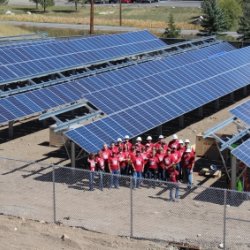Colorado has ambitious greenhouse-gas reduction goals, and the state’s Renewable Energy Standard (RES)—sometimes called a Renewable Portfolio Standard (RPS)—is a big part of those. The state’s favorable RES laws also make it easy for homeowners to benefit from free solar panels. Here’s what you should know—
What Is a Renewable Energy Standard?
A RES is a law that requires utility companies, such as Xcel, to source a certain amount of the electricity sold from renewable sources, such as wind or solar. Usually, these requirements are tiered and the targets increase over time. For example, a state may require its utility companies to increase the amount of energy sourced from renewables by three percent per year for 10 years. More than half of states in the country have RES/RPS standards! There is currently no federal RES/RPS in place.
What’s the RES in Colorado?
Colorado’s RES applies to investor-owned utilities, municipal utilities, and rural electric coops. While some states limit the types of energy considered “renewable” under the standard, Colorado’s law is generous: in addition to wind and solar, geothermal energy, hydroelectric energy, and even things like biomass and landfill gas are accepted. Under the law, investor-owned utilities were required to meet a standard of 30 percent of energy coming from renewable sources by 2020 (Xcel actually hit that number one year ahead of the deadline, in 2019). For utilities serving 500,000 or more customers, the RES standard requires that they transition to 100 percent clean energy by 2050.
Why Is a RES Important for Residential Solar Customers?
Having aggressive RES targets like those in Colorado incentivize utility companies to transition to clean energy, and homeowners with solar panels can help in the process. When a resident has solar panels on their home, they actually return unused energy to the grid (the utility) through net metering. Customers will then earn Renewable Energy Credits (RECs), which are credited to customers’ virtual “solar banks” and then applied to customers’ bills when their generation from the grid exceeds their generation from their panels. Thanks to favorable RES laws, solar panel-owning homeowners, the state, and utility companies have shared renewable energy goals, allowing them to work together to reduce greenhouse gas emissions.
Learn More About Free Solar with GRID Alternatives Today
If you’re interested in learning more about RES, how solar works, or how to get free solar panels on your home, reach out to our outreach team today! We’re thrilled to be part of the transition to a renewable energy future.

